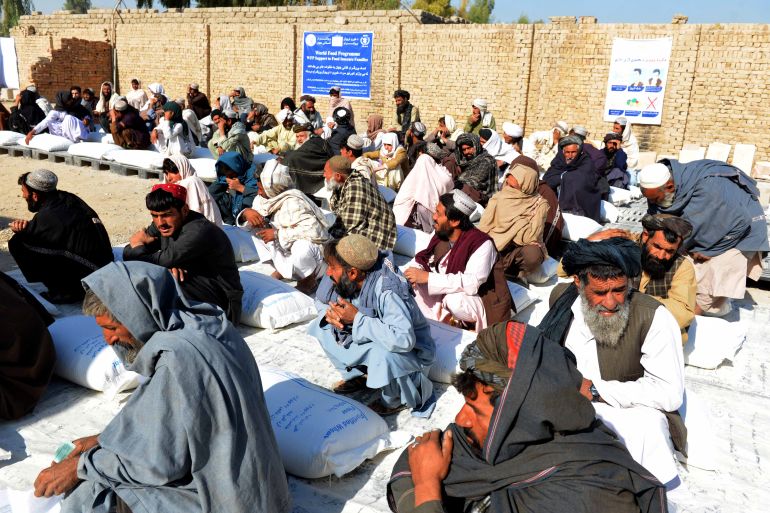Millions close to hunger after WFP cuts food aid to Afghanistan
Six million Afghans, the UN food agency warns, are one step away from famine as it appeals for more funds for Afghanistan.

Amina Mohammadi, a 34-year-old Afghan widow from the northern Afghan city of Mazar-i-Sharif, is among millions of Afghans reliant on rations provided by the World Food Programme (WFP).
But the mother of four is now worried about how to feed her children after the UN food agency last month announced drastic cuts in food assistance.
Keep reading
list of 4 itemsAfghanistan’s women: Life under Taliban restrictions
Will China’s latest investment in Afghanistan actually work?
International Women’s Day: The exclusion of Afghanistan’s women
The WFP has warned that if donors do not pledge new funds, the agency will not have the resources to carry out any food assistance by June.
“Our food distributions will drop from 13 million people in March to nine million people in April and five million people in May down to zero in June and onwards,” Philippe Kropf, the head of communications at WFP, told Al Jazeera.
Last month, the WFP, which provides food assistance to more than 20 million Afghans, said a severe shortage of funds forced it to drastically reduce its food assistance to the South Asian country facing a humanitarian crisis.
“The country is at the highest risk of famine in a quarter of a century and WFP’s food assistance is the last lifeline for millions of Afghans,” Hsiao-Wei Lee, WFP country director in Afghanistan, said in a statement last month.
Six million Afghans, the UN agency warned, are one step away from famine.
“Since November last year, the WFP in Afghanistan had been warning that funds would run out. Now faced with funding shortfalls, WFP had to start to reduce its lifesaving assistance to millions of people across the country,” Kropf said.
Women-led households
The UN agency needs nearly $800m to run its food assistance programme in the country for the next six months, Kropf said.
Kropf explained that the organisation initially reduced the quantity of assistance to some of the recipients, providing them with two weeks of food per month, as opposed to the previous ration that was sufficient for three weeks.
The cuts in food assistance are harder for women-led households in Afghanistan, in particular, where the breadwinners find their rights to employment, education and even movement restricted by the Taliban rulers.
Mohammadi, whose husband was killed last year, says there are no jobs for women in her neighbourhood. “I do everything I can: I wash clothes at neighbourhood homes, I do some tailoring – but it’s not sufficient to support my children,” she said.
Mohammadi told Al Jazeera that the monthly rations and cash she received from the WFP saved her family, including her four children, including three sons – 12, seven and four, and a 10-year-old daughter, from hunger.
“For the last few months, I collected rations of flour, beans, tea, salt, and nutritious food for the children,” she told Al Jazeera.
The country has been teetering on the brink of famine and economic collapse since the Taliban’s return to power in August 2021 after 20 years of war and US occupation.
The war-torn country’s economy, which was largely dependent on foreign funding, has not been able to revive because West-led international sanctions have dried up many sources of international aid. The Taliban administration’s financial and diplomatic isolation has further exacerbated the humanitarian situation in the country.
Aseel – a company that started out as e-commerce platform, but shifted its technology and resources to address the growing humanitarian crises following the Taliban’s takeover in August 2021 – has been using technology to go around sanctions and help people in need.
Madina Matin, the communications manager at Aseel, said their digital and tech-driven approach has helped connect donors to Afghan families, benefitting more than 500,000 Afghans in the last year and a half.
“The [US-led] sanctions and banking restriction limit Afghanistan’s access to international financial institutions and donors, which can impact the ability of national organisations to secure funding for humanitarian aid,” Matin told Al Jazeera, adding that the sanctions also had a chilling effect, creating “hesitancy among donors to provide aid to a country under sanctions”.
The Afghan administration, which has not been recognised by any country in the world, has appealed for its recognition and the lifting of sanctions. It has also urged the US to release billions of dollars of frozen Afghan funds desperately needed to revive the economy.
The group has faced international censure for its decision to curb women’s freedoms, including a ban on university and school education.
‘My children will die if you stop the ration’
Al Jazeera reached Taliban officials in two northern provinces, Balkh and Baghlan, who said that they were also concerned about the cutbacks in aid and rations. However, they declined further comment for this article.
With the aid to her family set to be reduced, Mohammadi faces an uncertain future. During the holy month of Ramadan, when Muslims fast from dawn to dusk, she is already limiting the portions of the two meagre meals her children have in the day, she said.
“I don’t know yet if they will still give me a package for this month. And I don’t know how I will feed my kids if they don’t provide me with ration,” she worries.
“I have lost so much already, even my dignity. I am pleading to the international community; my children will die if you stop the ration,” she says.